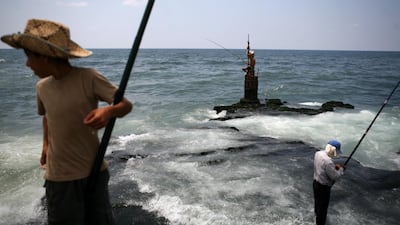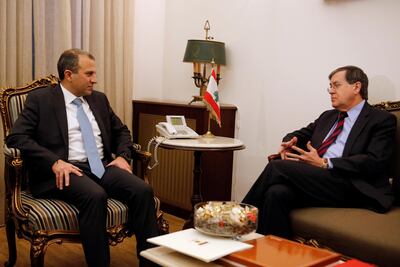Israel has officially expressed openness to US-mediated talks under UN supervision on a disputed maritime border with Lebanon in a bid to end a long-running Mediterranean dispute that has come to a head over oil and gas exploration.
Israeli Energy Minister Yuval Steinitz's office said in a statement after he met US envoy David Satterfield on Monday that talks to agree on a border could be "for the good of both countries' interests in developing natural gas reserves and oil".
Lebanese MP Yassine Jaber told The National that Mr Satterfield had informed Lebanese officials a few weeks ago that Israel agreed to Lebanon's request that the negotiations be conducted under UN supervision. Israel had not commented at the time.
In the past, Israel had rejected the UN's involvement although it was open to US mediation.
The focus of the issue is on a triangular 860 square kilometre wedge of the Mediterranean that both sides claim and is rich in subsea oil and gas.
Technically at war since Israel’s founding in 1948, the two neighbours have no diplomatic relations and the issue of the demarcation has lingered.
Mr Satterfield, who has been attempting to mediate a solution, is due in Beirut on Tuesday to follow up on his talks in Israel.
Lebanese politicians have welcomed his efforts.
MP Alain Aoun, who is affiliated to the president’s Free Patriotic Movement, said that it was “positive” that Israel was now open to UN involvement.
"Lebanon presented its position to the US, who mediated with Israel, and the answer was positive. One can say that it represents a step forward," he told The National.
“We cannot say that we have reached an agreement yet, but we have at least decided on the procedure."
The Lebanese believe that the UN’s involvement in the talks ensures fairness, argues Moustapha Allouche, a member of the prime minister’s Future Movement political bureau. “We don’t want the border negotiations to be subject to Israeli speculation. We want them to be grounded in international law."
Mr Jaber also described Mr Satterfield's mediation between the two countries as “positive”.
“Oil and gas need stability and tranquility in the area," he said.
According to Mr Jaber, the Israeli-Lebanese negotiations would be organised in the Lebanese border town of Naqoura, where monthly meetings between the two countries have taken place for the past 23 years under the supervision of the United Nations Interim Force in Lebanon (Unifil), which monitors the cessation of hostilities between the two countries.
This has allowed them to slowly agree on their land border, although it is still disputed in some areas.
When they begin, the maritime border talks would also include a US mediator, and the UN would act as a host, said Mr Jaber.
Israel’s long-time enemy, Iran-backed Hezbollah, has also green-lighted the negotiations, meaning that all Lebanese parties have adopted a unified position on how to deal with the maritime border dispute.
Quoted by Lebanese TV Al Manar, Hezbollah leader Hassan Nasrallah said in a speech on Saturday that his party trusts that the government will defend Lebanon’s rights during the negotiations.
The maritime border dispute dates back to when Lebanon and Cyprus agreed their boundaries in 2007 in order to zone special economic areas for oil and gas exploration. Israel then used the points agreed by Lebanon and Cyprus to define its maritime border with Cyprus.
In 2011, Lebanon sent a letter to the UN to clarify its demarcation but between the proposed boundary and the one submitted by Israel lay the wedge of now disputed sea.
Lebanon has previously suggested the UN could mediate between the sides, but Israel has refused and said it can only be done bilaterally.
Unifil did not respond to The National by the time this article went to print but a spokesperson had previously said that "the issue of maritime demarcation is outside Unifil's mandate under Security Council resolution 1701".
That means that should Unifil be involved in maritime border negotiations, its mandate would have to be amended, probably when it is extended next August.
Lebanon is eager to cash in on revenue from offshore oil and gas as its economy struggles with sluggish growth rate and an alarming deficit.
Last year, Lebanon awarded its first contracts for oil and gas exploration to a consortium of France’s Total, Italy’s Eni and Russia’s Novatek. One of the areas awarded for exploration was Block 9 that falls partly in that disputed area – although the firms say they will only drill away from the disputed part.
In recent months, Mr Satterfield has been attempting to mediate between the sides to find a solution. He has strong connections in Lebanon, having served as US ambassador to Beirut between 1998 and 2001.
Although Lebanese officials expressed an interest in seeing the demarcation completed and were open to US mediation, they also joined their Israeli counterparts in a game of brinkmanship over the issue. Both sides have made bellicose statements warning the other and playing on nationalistic sentiment.



